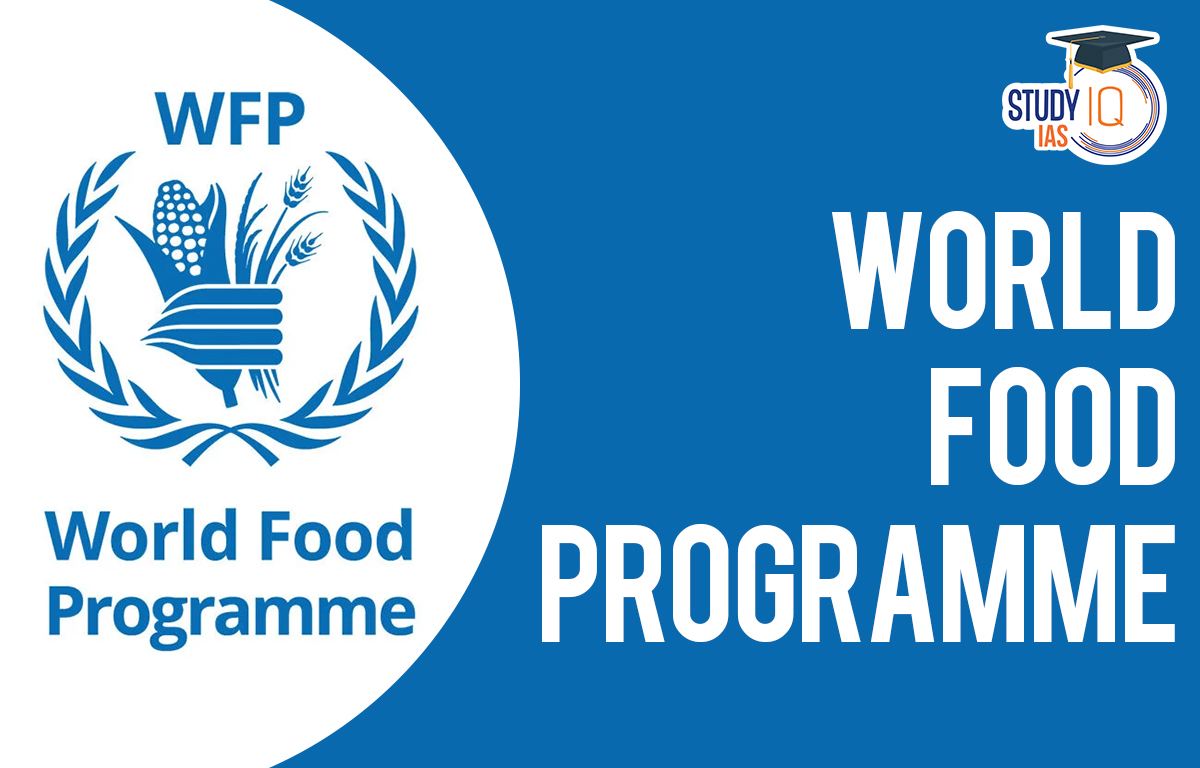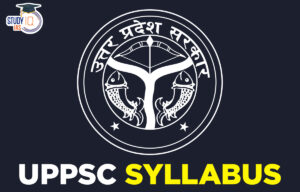Table of Contents
World Food Programme (WFP)
The World Food Programme (WFP) is a United Nations agency founded in 1961. Its primary goal is to combat hunger and malnutrition in developing countries by providing food assistance and improving food security. It is also a member of the United Nations Sustainable Development Group (UNSDG), a coalition of UN agencies and organisations dedicated to achieving the SDGs.
The World Food Programme (WFP) is an international organisation that works to alleviate hunger and ensure food security. Such international organisations and programmes are essential for the UPSC Syllabus. The organisation has received numerous humanitarian awards, including the Nobel Peace Prize in 2020 for its efforts to combat hunger and improve peace in conflict-affected areas. This article will tell you everything you need to know about the World Food Programme and its work, particularly in India.
World Food Programme Headquarters
The headquarters of the World Food Programme (WFP) is located in Rome, Italy. The WFP also has offices and operations in various locations around the world, including in Africa, Asia, the Middle East, and Latin America.
World Food Programme Objective
- WFP focuses on disaster relief, as well as rehabilitation and development assistance. Two-thirds of its work takes place in conflict zones, where people are three times more likely to be malnourished than elsewhere.
- It collaborates closely with the other two UN agencies based in Rome:
- The Food and Agriculture Organization (FAO), assists countries in developing policies and changing laws to support sustainable agriculture.
- The International Fund for Agricultural Development (IFAD) funds projects in impoverished rural areas.
- To end hunger by ensuring food access.
- Improving nutrition and achieving food security are two goals.
- Supporting the SDGs’ implementation and collaborating to achieve their goals.
World Food Programme Working
WFP works in over 120 countries and territories to provide life-saving food to people who have been displaced by conflict or rendered destitute by natural disasters.WFP works with governments, non-governmental organisations, and other partners to provide food assistance and support programmes that address the root causes of hunger in over 80 countries. Emergency food assistance, school feeding programmes, nutrition programmes, and food-for-work initiatives are among the services offered by the organisation.
By 2030, the international community has pledged to end hunger, achieve food security, and improve nutrition.
World Food Programme Functions
WFP is entirely supported by voluntary contributions. It is governed by an Executive Board of 36 member countries. It collaborates closely with the Food and Agriculture Organization (FAO) and the International Fund for Agriculture Development (IFAD). WFP also collaborates with a number of national and international non-governmental organisations (NGOs). It is a participant in the United Nations Development Programme (UNDP). It is led by an Executive Director who is jointly appointed by the UN Secretary-General and the FAO Director-General.
World Food Programme Funding
WFP is entirely supported by voluntary contributions from governments, organisations, and individuals. Governments are the organization’s primary source of funding; it receives no dues or portions of UN-assessed contributions. Over 60 governments fund WFP’s humanitarian and development projects on average. Individual corporations make critical contributions to the fight against hunger through corporate-giving programmes. Individual contributions can make a difference in the lives of those who are hungry. A person can donate:
- During a crisis, emergency food rations are distributed.
- Special school food for hungry children.
- Food incentives are being offered to poor families in order to encourage them to send their daughters to school.
- Food as payment for rebuilding schools, roads, and other infrastructure after conflicts and natural disasters.
World Food Programme and India
For many years, the World Food Programme (WFP) has worked in India to support the government’s efforts to improve food security and nutrition. The World Food Programme’s work in India focuses on the most vulnerable populations, such as women, children, and people affected by conflict and disasters. The provision of school meals is a major focus of WFP’s work in India. WFP provides hot, nutritious meals to millions of children in government schools across the country through its school feeding programme.
In response to the COVID-19 pandemic, WFP aided the government’s efforts to provide food assistance to vulnerable households affected by lockdowns. WFP provides technical assistance and support to the government in areas such as food security, nutrition, and disaster risk reduction, in addition to its operational work. Overall, the World Food Programme’s work in India has been critical in improving food security and nutrition outcomes for millions of people.
WFP aids the Indian government’s numerous food safety measures. The organization’s first focus in India was on food distribution. Yet as India has continuously improved its cereal output, the organisation has changed its focus to providing technical support to the government for initiatives connected to it.
Over 800 million poor people nationwide receive supplies of rice, wheat, sugar, and kerosene oil from the country’s own subsidised food distribution system, which WFP is working to make more accountable, effective, and transparent.
WFP collaborates with numerous NGOs in India in addition to partnering with Indian governments. Despite the nation’s substantial progress in reducing poverty and raising per capita income, the prevalence of malnutrition is still very high. India ranked 107th out of 121 countries in the Global Hunger Index (GHI) 2022. In accordance with the country strategy plan for India (2019–2023), WFP seeks to: Make it possible for India’s most vulnerable citizens to satisfy their year-round minimum food and nutrition needs.
Reports Released by World Food Programme
Global Report on Food Crises: The Global Report on Food Crises describes the global scope of acute hunger. It examines the factors that are contributing to food crises around the world. The Global Network Against Food Crises, an international alliance working to address the root causes of extreme hunger, created the report.
World Food Programme & Food and Agriculture Organisation
- Both organisations collaborate with one another. Both are governed by the United Nations. While the FAO is a specialised organisation, the WFP is a UNDP programme.
- Both have their headquarters in Rome, the FAO was founded much earlier than the WFP. The FAO was established in 1945, and the WFP in 1961.
- FAO focuses its efforts on improving nutrition, increasing agricultural productivity, raising rural living standards, and assisting in global economic development. The World Food Programme, on the other hand, is a food assistance programme with a focus on emergency situations, though it also works in other areas.
World Food Programme UPSC
The World Food Programme (WFP) is a global organisation dedicated to alleviating hunger and malnutrition in developing countries. The World Food Programme’s work and its impact on global food security and nutrition are important topics covered in the UPSC exam, particularly in international relations, development studies, and current affairs.
UPSC aspirants can benefit from understanding the World Food Programme’s mandate, operations, and impact on food security and nutrition in developing countries. This understanding can assist them in answering questions about international organisations, global hunger and malnutrition, and development policies.
Some specific WFP topics that UPSC aspirants may find useful include:
- The WFP’s history and evolution, as well as its role in international development and humanitarian assistance.
- Emergency food assistance, school feeding programmes, nutrition programmes, and food-for-work initiatives are among the WFP’s programmes and initiatives.
- The World Food Programme’s role in responding to humanitarian crises such as natural disasters, conflict, and pandemics.
- WFP collaborations with governments, NGOs, and other stakeholders to address food security and nutrition issues.
- The impact of WFP work on global hunger and malnutrition, as well as its contribution to achieving the SDGs.
The World Food Programme (WFP) has been awarded the Nobel Peace Prize 2020 for its efforts to combat hunger, improve peace conditions in conflict-affected areas, and prevent the use of hunger as a weapon of war and conflict. Overall, a thorough understanding of the World Food Programme and its work can assist UPSC aspirants in developing a comprehensive understanding of international development and current affairs, which can be useful in answering questions on multiple exam papers.


 UPPSC Syllabus 2025 PDF, Check Prelims a...
UPPSC Syllabus 2025 PDF, Check Prelims a...
 Gender Gap in Household Chores Persists ...
Gender Gap in Household Chores Persists ...
 India’s Nuclear Energy Strategy, Futur...
India’s Nuclear Energy Strategy, Futur...





















